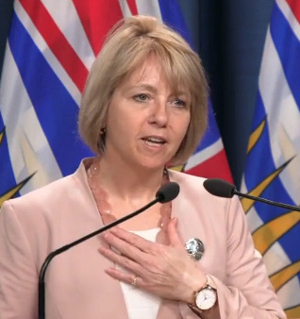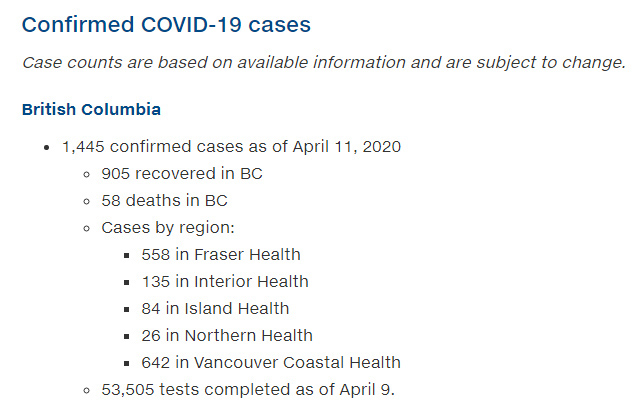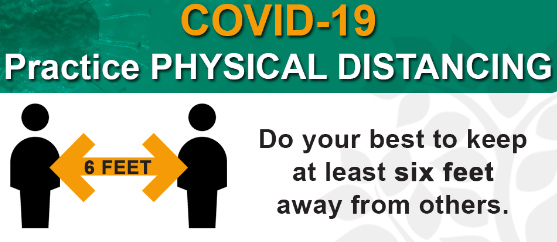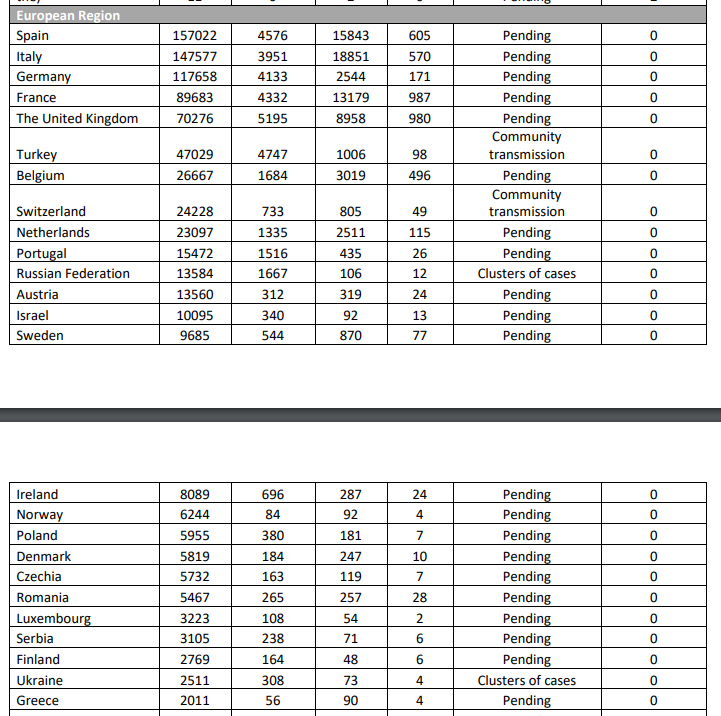
Saturday April 11, 2020 ~ GLOBAL
by Mary Brooke, B.Sc. ~ West Shore Voice News
It was about one month ago that the COVID-19 pandemic was officially declared by the World Health Organization (WHO).
In statistics released today April 11 in WHO’s 82nd situational report on the number of infections and deaths, there is a tally of 1,610,909 confirmed cases worldwide (up from 1,521,252 yesterday) and 99,690 deaths (that’s 6,892 more than reported on April 10).

Compared even to world war death tolls, the numbers continue to be staggering, in particular for hot spots where containment of community spread is out of control.
USA & Canada:
The most rapid spread of infection in North America is in the United States, where about one-third of the world’s COVID-19 cases have now happened. April 11 statistics show the USA with 461,275 confirmed cases and 16,596 deaths in total (that’s up by 1,931 in the last 24 hours, similar to the 1,925 increase seen between April 9 and 10).
New York City is currently an intense hot spot where people are dying so quickly that unclaimed bodies are being buried in mass burial grounds
(in separate caskets) because there is no room left in morgues. Pittsburgh and Detroit are also now USA hot spots. All of those northeast/seaboard cities are relatively close to southern Ontario.
Two days ago, the White House task force on COVID-19 said that Washington, DC, Baltimore, and Philadelphia are expected to be hot spots soon.
On the west coast of the USA, Washington State has been an epicenter, causing concern for Canada (for BC in particular). Travel restrictions between Canada and the USA were put in place mutually between the two countries about a week ago, though in BC additional requirements as to more rigorous requirements were put in place on April 8 around ensuring the federally-mandated 14-day isolation required of all returning travellers.
Canada & BC:
Canada by comparison (with a population size about 10% of the USA’s) has 21,226 confirmed cases of COVID-19 (up from 19,759 yesterday and 18,433 on Thursday) as reported by WHO, and 531 deaths (a tally that is up from 461 deaths on Friday and 401 on on Thursday).
Canada’s death tally is about 0.05 percent of the global total.

Today Alberta donated personal protective equipment to Ontario, Quebec and BC from stockpiles they’ve now apparently had on hand. Alberta Premier Jason Kenney announced today that his province is donating 750,000 N95 masks, seven million procedural masks and 50 ventilators, as well as gloves and goggles, to the three provinces, which are at risk of running low on medical equipment as they fight to contain outbreaks of the novel coronavirus.
Ontario and Quebec have been hit hard by COVID-19, reporting 253 and 241 deaths respectively, with much higher hospitalization rates compared to Alberta. Ontario will see the largest portion of Alberta’s donations (2.5 million procedural masks and all 50 ventilators), which are expected to remain in Ontario through the peak of its COVID-19 outbreak. Kenney said he received calls from those premiers last week asking for assistance with medical supplies.
While BC is faring better that Alberta (with a similar ‘flattened curve’), BC will receive a package of 250,000 N95 masks to help cope with relatively higher hospitalization rates.
The Premiers of Quebec, BC and Ontario expressed their thanks to Kenney, who was not shy about saying he hopes they will remember Alberta later on when it comes to sorting out the oil and gas economic issues.
BC’s main outbreaks have been in long-term care homes. Of the 24 affected care homes, 20 are still dealing with active outbreaks. Both residents and care workers are impacted in these scenarios.
Today BC Provincial Health Officer Dr Bonnie Henry publicly announced the BC Centre for Disease Control stats: 1,145 total cases in BC, with 35 of those new (distribution 642 in Vancouver Coastal, 558 in Fraser Health, 84 on Vancouver Island, 135 in the interior, and 26 in the north). Of the total cases in BC, 246 have been in long term care (affecting 153 residents and 93 staff).

Of the current COVID-19 cases in BC, 134 are hospitalized (63 of those in intensive care). Reported as fully recovered from COVID-19 in BC: 905.
Three new deaths today in BC bring the total deaths in this province to 58. That’s about 10.9% of Canada’s total COVID-19 death tally and 0.115% of the world’s COVID-19 death count.

COVID-19 Travel Restrictions in BC:
In BC there is an official state of emergency and as a society we are effectively on lockdown through a mosaic of measures issued by the Public Health Officer.
This four-day Easter long weekend will for many people seem peculiarly long — due to restriction of normal Easter family or community celebrations and overall activity restrictions. Oddly, what is usually seen as a welcome break from routines, a four-day long weekend is now just part of a long line of days without regular (or normal / previous) routines.
British Columbians are being asked to stay home in self-isolation and to maintain physical distancing if they do not need to go out for essential reasons. Provincial parks are closed in BC, and people are reminded to keep the 2-metre/6-foot distance if going outdoors in their own neighbourhood for some fresh air.
Travel to remote communities is strongly discouraged, as smaller towns may not have the hospital infrastructure to handle a COVID-19 case or outbreak, and frankly the reduction of vehicle traffic reduces the potential impact on first responders including paramedics at this time.
As a case in point, some young adults went skiing this weekend, and one ended up requiring rescue and hospital care for a serious back injury — that incident took up resources that could be needed for COVID-19 outbreaks and potentially exposed first responders to COVID-19 (while using up time and resources that are possibly being conserved for pandemic response).
BC’s Timing on Physical Distancing:
BC’s Provincial Health Officer said earlier this week that trying to institute physical distancing back in January or February would probably not have been taken seriously in BC; the strategy was, therefore, to wait until the scare of a declared global pandemic was officially in place before clamping down.

Given the attentive rate of compliance by British Columbians since mid-March around self-isolation (i.e. staying home) and physical distancing (i.e. staying 2 metres or 6 feet away from other people), it was probably the right call for BC, but it leaves for later a philosophical evaluation about how entwined we have become in BC with our beliefs about rights and freedoms vs the common good.
Global review – the spread in Europe:

The most rapid spread of infection in Europe has been in Spain and Italy in recent weeks, with Germany, France and the UK also battling the spread.
While Italy had the most rapid rate of infections and deaths for a while, Spain surpassed Italy over a week ago and they both see robust daily death rates. The number of cases in Spain on April 11 was 157,022 (up from 152,446 in one day) with 15,843 deaths (up 605 in one day, which is slightly lower than the increase of 683 between April 9 & 10). That’s more deaths in one day in Spain than we’ve seen overall in Canada so far.
Italy today showed 147,577 confirmed cases (up from 143,626 yesterday and 139,422 on April 9) and 18,281 deaths (up by 612 in one day). France saw 987 deaths in one day yesterday (down from 1,339 deaths on April 10), and the UK (where even their Prime Minister is in hospital with COVID-19) saw 980 deaths in one day yesterday (on the upswing from 881 deaths on April 10); that brings the UK’s total cases to 70,276 and total deaths to 8,958. Germany seems to have surpassed the worst of their increases; with 117,658 confirmed cases their tally of 2,544 deaths is up by ‘only’ 171 today.
Where restrictive social movement was brought in relatively quickly and without apology (such as in Israel and Norway), the death count is relatively low: 10,095 cases in Israel (92 deaths), and 6,244 confirmed cases in Norway (92 deaths).
The original epicenter for COVID-19 (where the virus first emerged in December 2019) was China, where new cases slowed down a few weeks ago and life is beginning to return to a new version of normal. Today their tally is 83,369 (up from 83,305 yesterday) with 3,349 deaths (up by four in the last day).
Vaccine & immunity:

A tested and available vaccine against COVID-19 is not expected any time ahead of Fall 2021, given the time for development, clinical trials, production and distribution.
However, clinical trials are coming as soon as this month in Canada using plasma exchange that contains COVID-19 antibodies from people who have now recovered from the disease.
Recovered patients in Canada may soon be contacted to participate in serology tests, it was confirmed by BC’s Provincial Health Officer today.


